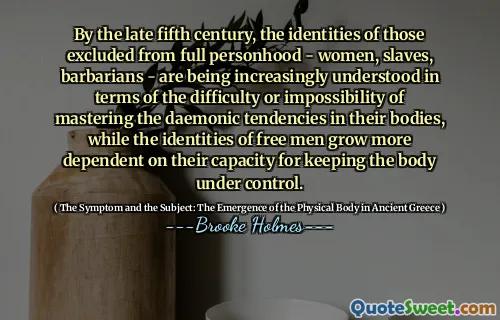"The Symptom and the Subject: The Emergence of the Physical Body in Ancient Greece" explores the historical development of ideas regarding the human body in ancient Greek culture. The author examines how ancient Greeks perceived physical ailments and the relationship between the body and identity. This study highlights the transition from a spiritual understanding of illness to a more physiological perspective, emphasizing the role of the body in shaping human experience and subjectivity.
The book delves into various philosophical, medical, and literary texts from ancient Greece, showcasing how these works contributed to the evolving notion of the physical body. It discusses key figures, such as Hippocrates, and how their thoughts laid the groundwork for future medical conventions. Through this lens, the author illustrates the interplay between cultural beliefs and the interpretation of physical conditions.
Ultimately, "The Symptom and the Subject" provides a comprehensive analysis of how ancient Greek society constructed notions of health, illness, and the self. By contextualizing these ideas within their historical framework, the author highlights the significance of bodily experiences in understanding human existence and the evolution of medical thought in Western history.
More »
Today Birthdays
1887 -
Robinson Jeffers
1864 -
George Washington Carver
1936 -
Stephen Ambrose
1953 -
Pat Benatar
1949 -
George Foreman
1945 -
Rod Stewart
1936 -
Robert Woodrow Wilson
1938 -
Donald Knuth
1974 -
Hrithik Roshan
1956 -
Antonio Munoz Molina
1980 -
Sarah Shahi
1936 -
Al Goldstein
1939 -
David Horowitz
1955 -
Michael Schenker
1986 -
Abbey Clancy
1959 -
Chris Van Hollen
1989 -
Emily Meade
